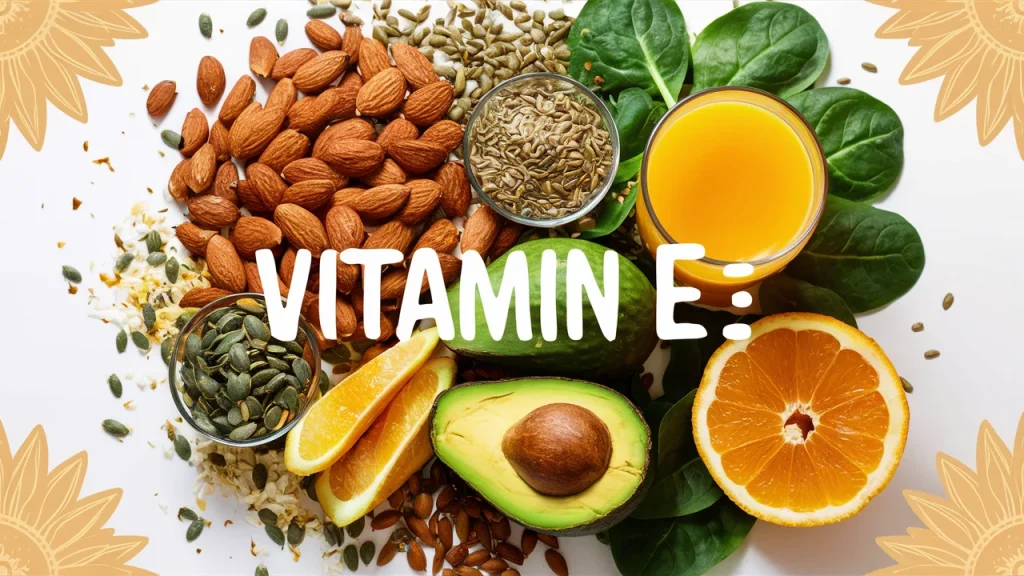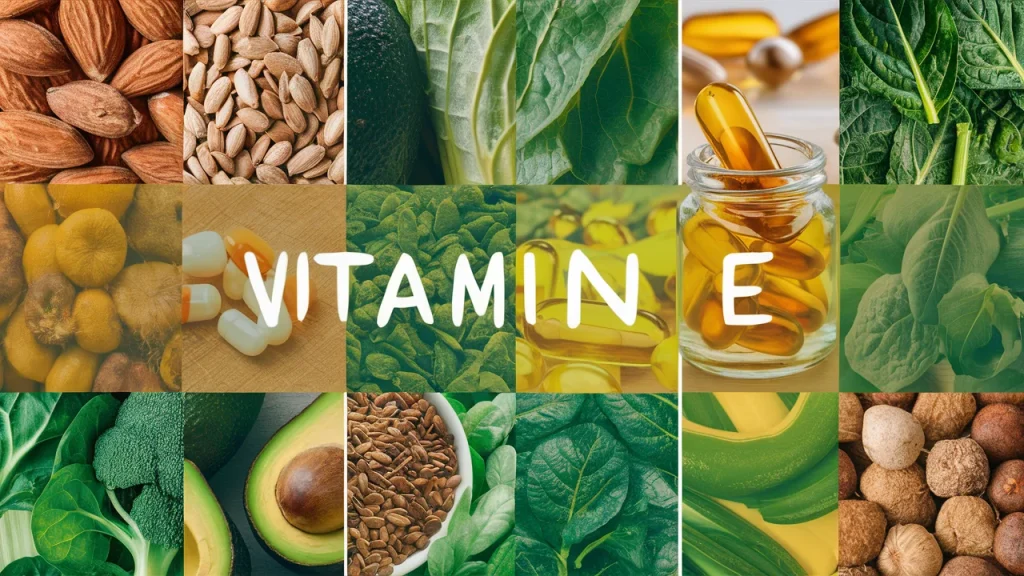Vitamin E is a fat-soluble vitamin that plays a crucial role in promoting overall health and well-being. As a powerful antioxidant, vitamin E helps protect the body’s cells from damage caused by free radicals, supporting a wide range of vital functions. This article explores the remarkable benefits of vitamin E, from nourishing the skin to boosting the immune system and maintaining cardiovascular health.

Key Takeaways
- Vitamin E is a fat-soluble nutrient that acts as a powerful antioxidant in the body.
- Vitamin E can help reduce the visible signs of aging, such as fine lines and wrinkles, by fighting free radical damage.
- Vitamin E supports a healthy immune system by protecting immune cells from oxidative stress.
- Vitamin E promotes cardiovascular health by helping to maintain healthy blood pressure and cholesterol levels.
- Vitamin E can be obtained from various natural sources, such as vegetable oils and nuts, or through supplementation.
What is Vitamin E?
Vitamin E is a group of fat-soluble compounds known as tocopherols and tocotrienols, with alpha-tocopherol being the most active and abundant form in the body. Vitamin E acts as a powerful antioxidant, helping to neutralize harmful free radicals and protect cells from oxidative damage. This antioxidant function is crucial for maintaining overall health and preventing various age-related conditions.
Understanding Alpha-Tocopherol
Among the various forms of vitamin E, alpha-tocopherol is the most biologically active and the primary form found in the human body. This specific tocopherol is responsible for the majority of vitamin E‘s health benefits, playing a crucial role in the proper functioning of the body’s cells.
Vitamin E’s Antioxidant Properties
Vitamin E is a potent antioxidant that helps protect the body’s cells from the damaging effects of free radicals. By neutralizing these unstable molecules, vitamin E can help prevent oxidative stress, which has been linked to a wide range of health issues, including age-related conditions. This antioxidant activity is particularly important for maintaining overall health and well-being.
The fat-soluble nature of vitamin E allows it to be readily absorbed and transported throughout the body, enabling it to provide comprehensive antioxidant protection to various tissues and organs. Vitamin E can be obtained from a variety of natural sources, such as vegetable oils, nuts, and leafy green vegetables, making it an essential nutrient for a balanced and healthy diet.
Vitamin E for Radiant Skin
Vitamin E is a renowned skincare ingredient due to its powerful antioxidant properties. By fighting free radical damage, vitamin E can help reduce the visible signs of aging, such as fine lines, wrinkles, and age spots. This essential nutrient plays a crucial role in maintaining the health and youthful appearance of the skin.
Anti-Aging Benefits
As a potent antioxidant, vitamin E neutralizes harmful free radicals that can accelerate the aging process. By protecting the skin from oxidative stress, vitamin E helps to minimize the formation of fine lines and wrinkles, while also fading the appearance of age spots and sun damage. Regular use of vitamin E-infused skincare products can help to keep the skin looking radiant, plump, and youthful for longer.
Nourishing Skin Health
Beyond its anti-aging benefits, vitamin E is also essential for overall skin health and nourishment. This fat-soluble vitamin promotes the production of collagen, a vital protein that maintains the skin’s elasticity and firmness. Additionally, vitamin E helps to lock in moisture, keeping the skin hydrated and supple. For those seeking healthy, glowing skin, incorporating vitamin E into their skincare and hair care routines can be tremendously beneficial.
The versatility of vitamin E makes it a valuable addition to any comprehensive skin care regimen. By harnessing its antioxidant power and nourishing properties, individuals can achieve a radiant, youthful-looking complexion that exudes health and vitality.
Vitamin E and Immune Function
Vitamin E plays a crucial role in supporting the immune function. As a powerful antioxidant, it helps protect the body’s immune cells from oxidative stress, allowing them to function more effectively. This enhances the immune system’s ability to defend against infections and illnesses.
Furthermore, vitamin E has been shown to improve the absorption of other essential nutrients, such as vitamins A and C, which are also vital for maintaining a robust immune response. By promoting the efficient utilization of these nutrients, vitamin E strengthens the immune system and helps the body better respond to various health challenges.
Studies have demonstrated that adequate vitamin E intake can help boost the activity of immune cells, including T cells and natural killer cells, which are essential for fighting off infections and diseases. This nutrient also supports the production of antibodies, further enhancing the body’s immune support.
In addition to its direct impact on the immune system, vitamin E’s antioxidant properties play a crucial role in protecting the body from the harmful effects of free radicals. This oxidative protection helps maintain the overall health and function of the immune system, allowing it to operate at its full potential.
By incorporating vitamin E into a balanced diet and lifestyle, individuals can effectively support their immune function and strengthen their body’s natural defenses against various health threats. This essential nutrient offers a multi-faceted approach to immune support, making it a valuable addition to any wellness regimen.
Vitamin E for Overall Health
In addition to its remarkable benefits for the skin and immune system, vitamin E promotes overall well-being in numerous ways. This versatile nutrient has been shown to support cardiovascular health by helping to maintain healthy blood pressure and cholesterol levels, thereby reducing the risk of heart disease and cardiovascular complications.
Heart Health Benefits
Studies have consistently demonstrated the cardioprotective effects of vitamin E. By acting as a powerful antioxidant, this nutrient helps protect the heart and blood vessels from oxidative damage, improving overall heart health and cardiovascular function. Regular consumption of vitamin E-rich foods or supplements may contribute to a lower risk of heart attacks and strokes.
Fertility and Reproductive Support
Vitamin E plays a crucial role in fertility and reproductive health. This nutrient has been linked to improved sperm quality and embryo development, making it an essential component for couples trying to conceive. Additionally, vitamin E may help support hormonal balance and overall reproductive function.
Eye Health Advantages
Interestingly, vitamin E has also been found to support eye health. Studies suggest that this antioxidant nutrient may help reduce the risk of age-related macular degeneration and cataracts, two of the leading causes of vision impairment in older adults. By protecting the eyes from oxidative stress, vitamin E contributes to maintaining clear, healthy vision.
Conclusion
Vitamin E is a remarkable nutrient that offers a wide range of benefits for the body and skin. As a powerful antioxidant, it helps protect cells from oxidative damage, supporting healthy skin, immune function, cardiovascular health, and more. While vitamin E can be obtained from various natural sources, such as vegetable oils, nuts, and leafy greens, dietary supplement may be beneficial for those with specific dietary needs or health concerns.
By incorporating vitamin E into a balanced lifestyle, individuals can unlock the full potential of this essential nutrient and promote overall well-being. From nourishing the skin to boosting the immune system and maintaining cardiovascular health, this versatile vitamin plays a crucial role in supporting the body’s natural functions and protecting it from the damaging effects of free radicals.
Whether through natural sources or dietary supplement, ensuring adequate vitamin E intake can be a valuable addition to any health-conscious individual’s routine. By capitalizing on the benefits of this remarkable nutrient, one can take proactive steps towards achieving optimal health and wellness.
FAQ
What is vitamin E and what are its main benefits?
Vitamin E is a fat-soluble vitamin that acts as a powerful antioxidant in the body. Its main benefits include promoting healthy skin, supporting immune function, maintaining cardiovascular health, and protecting cells from oxidative damage.
How does vitamin E support skin health and appearance?
Vitamin E is a renowned skincare ingredient due to its antioxidant properties. It can help reduce the visible signs of aging, such as fine lines and wrinkles, and promote collagen production to maintain skin elasticity and moisture levels. Vitamin E also supports healthy hair growth.
What is the role of vitamin E in immune function?
Vitamin E plays a crucial role in supporting the immune system. As an antioxidant, it helps protect immune cells from oxidative stress, allowing them to function more effectively. Additionally, vitamin E enhances the absorption of other essential nutrients, such as vitamins A and C, which are important for maintaining a strong immune response.
How does vitamin E benefit overall health?
Vitamin E offers a range of benefits for overall health. It supports cardiovascular health by helping to maintain healthy blood pressure and cholesterol levels, reducing the risk of heart disease. Vitamin E also plays a crucial role in fertility and reproductive health, contributing to sperm quality and embryo development. Furthermore, this vitamin supports eye health, potentially reducing the risk of age-related macular degeneration and cataracts.
What are the best natural sources of vitamin E?
Vitamin E can be found in a variety of natural sources, including vegetable oils (such as sunflower, safflower, and olive oil), nuts (including almonds, hazelnuts, and peanuts), and leafy green vegetables. These foods can provide a good source of the different forms of vitamin E, including alpha-tocopherol, the most active and abundant form in the body.
Can vitamin E be taken as a supplement, and what are the potential side effects?
Yes, vitamin E can be taken as a dietary supplement, especially for those with specific dietary needs or health concerns. While vitamin E is generally well-tolerated, high doses may cause side effects such as nausea, diarrhea, or headaches. It’s important to consult with a healthcare professional before starting any vitamin E supplement regimen, especially for individuals with certain medical conditions or who are taking medications.











